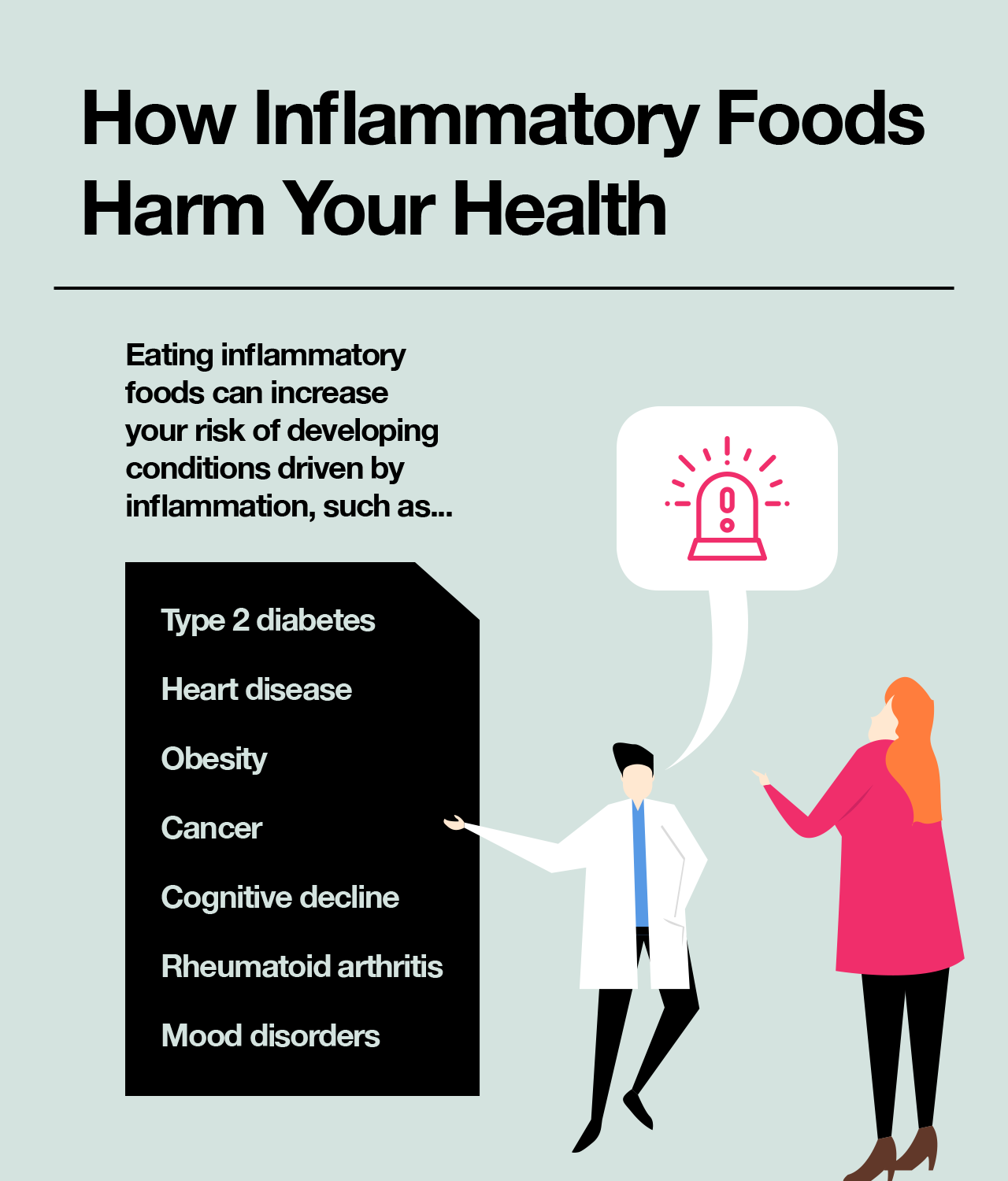Are You Undermining Your Health by Eating These 7 Foods That Cause Inflammation?
 By: by Amino Science
By: by Amino Science

The foods you eat can seriously impact inflammation levels in your body. Some foods help to quell out-of-control inflammation while others fan the flames. In this article, we’ll discuss how to reduce inflammation in the body, the health risks of inflammation, and seven foods that cause inflammation.
How Do You Reduce Inflammation in Your Body?
In the short term, inflammation can be your body’s way of protecting itself from injury or sickness. When your immune system recognizes anything foreign—which ranges from plant pollen to invading microbes—it often uses inflammation to fight back against what registers as a threat. This type of inflammation can actually be healing.
But when inflammation lingers, either after the threat has been resolved or when the threat was a false alarm to begin with, it can be quite damaging. Sustained, chronic inflammation is the opposite of healing. Studies have linked chronic inflammation to arthritis, heart disease, depression, diabetes, Alzheimer’s, obesity, and more.
When it comes to how you reduce inflammation in your body, your diet is one of the most powerful tools you have. "Many experimental studies have shown that components of foods or beverages may have anti-inflammatory effects," said Dr. Frank Hu, professor of nutrition and epidemiology in the Department of Nutrition at the Harvard School of Public Health.
Eating an anti-inflammatory diet loaded with beneficial compounds—including amino acids—can be a wonderful way to lower inflammation in your body. Both nonessential amino acids and essential amino acids fight inflammation in a variety of ways.
While amino-acid rich foods decrease inflammation, other foods accelerate it. Avoiding those inflammatory foods is just as important as adding healthful options to your diet.
The Health Risks of Inflammatory Foods
A wealth of research has made it clear that eating certain foods can cause inflammation levels in the body to spike. When looking over a list of inflammatory foods, you’ll soon realize that practically most of the items on that list are known health saboteurs, like soda and processed meats.

"Some of the foods that have been associated with an increased risk for chronic diseases such as type 2 diabetes and heart disease are also associated with excess inflammation," Dr. Hu said. “It's not surprising, since inflammation is an important underlying mechanism for the development of these diseases."
Many unhealthy, inflammatory foods have been linked to weight gain, which can also increase inflammation in your body. When researchers factor out that weight gain, however, the link between the foods and higher levels of inflammation remains.
According to Hu, that indicates certain components of the foods have independent effects on inflammation separate from their tendency to lead to weight gain.
7 Foods That Cause Inflammation
Each entry on this inflammatory foods list has been linked to adverse health effects by thorough, high-quality research. For some, it’s safe to consume moderate amounts, but easy to overindulge and get yourself into trouble. For others. It’s best to stay away altogether.

1. Sugar
The two main types of added sugar in the Western diet are table sugar and high-fructose corn syrup. Both these added sugars can increase inflammation, which subsequently increases your risk of a number of adverse health conditions.
According to a study published in Food & Function, eating a diet that contains high concentrations of fructose or sucrose, the two main components of sugar, can dramatically increase inflammation. The researchers found that it also adversely affected carbohydrate metabolism and antioxidant levels.
Another study investigated whether increased inflammation was the driving factor behind the established link between excessive sugar intake and breast cancer. The researchers found that: “sucrose intake in mice comparable with levels of Western diets led to increased tumor growth and metastasis.” They determined that effect had to do with inflammation-related changes to enzyme signalling.
And it appears that you can’t use healthy foods to undo the damage caused by unhealthy ones. In fact, the reverse may be true. A study published in PLoS One found that a high-sugar diet actually cancelled out the anti-inflammatory impact of omega-3 fatty acids!
2. Artificial Trans Fats
Created by adding hydrogen to unsaturated fats, which are liquid, in order to give them more stability, artificial trans fats are just plain bad for you.
Often appearing on ingredient lists as “partially hydrogenated” oils, these unhealthy fats with a long shelf life can be found in margarine as well as numerous other processed foods. A number of large, high-quality studies have shown that artificial trans fats cause inflammation.
Findings published in the Journal of Nutrition revealed that artificial trans fat intake raises markers of inflammation, including C-reactive protein (CRP). Participants who ate the most trans fats had 78% higher levels of CRP than other participants. The researchers carefully controlled for other factors related to inflammation, such as age, body mass index (BMI), physical activity, smoking status, alcohol consumption, postmenopausal hormone therapy, and intake of monounsaturated, polyunsaturated, and saturated fatty acids.
Other studies confirm this link. A randomized, cross-over study published in the American Journal of Clinical Nutrition also found that increasing your intake of trans fats raised inflammation levels. And a randomized trial that focused specifically on how trans fats affect women’s health found that consuming artificial trans fats activates the tumor necrosis factor system, a known driver of inflammation.
3. Fried Foods
Surely it comes as no surprise that fried foods aren’t good for you. What you might not realize, however, is just how far-reaching the adverse health effects of eating French fries and other deep-fried foods can be.
“Research has shown that individuals who eat a diet high in deep-fried foods show a higher prevalence of inflammatory markers,” said Dr. Obianuju Helen Okoye, a public health physician and healthcare consultant based in St. Louis, MO.
A 2017 study that analyzed data from 5,083 participants found that eating fried foods was one of the dietary choices that led to chronic, low-grade inflammation. And that inflammation, in turn, increased the likelihood that participants would develop cognitive decline.
4. Refined Carbohydrates
Not all carbs are problematic, but refined carbohydrates definitely promote inflammation. One reason for that is most of their fiber has been removed. The fiber in unrefined, complex carbohydrate-dense foods promotes fullness, improves blood sugar control, and nourishes the helpful bacteria in your gut. Eating simple, refined carbohydrates on the other hand can, research shows, increase inflammation and spur insulin resistance.
A study that followed 1,490 women and 1,245 men for 13 years looked at how carbohydrate consumption influenced their chances of developing diseases linked to inflammation. Participants who reported the highest intake of refined carbohydrates and other high glycemic index (GI) foods were 2.9 times more likely to die of an inflammatory disease compared to those with the lowest intake.
5. Soda
Research indicates that even indulging in a soda on occasion can damage your health. Given that research has shown soda can increase your risk of chronic inflammatory diseases such as type 2 diabetes and cardiovascular diseases, a team of scientists set out to track how soda intake affects your risk of developing rheumatoid arthritis (RA), another condition caused by underlying inflammation.
After analyzing data from 186,900 participants who had tracked their soda consumption over several decades, the team found that consuming less than a single serving of soda daily increased their risk of developing RA by 63% compared to those who did not drink soda or who drank less than a serving a month.
6. Processed Meat
Studies have shown that eating processed meat makes you more likely to develop a whole host of diseases linked to inflammation, including heart disease, diabetes, stomach cancer, and colon cancer.
Popular types of processed meat such as sausage, bacon, ham, and beef jerky contain high levels of a type of compound called advanced glycation end products, or AGEs. Research published in the Journal of the American Dietetic Association and elsewhere shows that AGEs, which form when meats and certain other foods that are high in fat and protein are cooked at high temperatures, can significantly increase inflammation and oxidative stress.
So far, the evidence linking processed meat intake and the development of colon cancer is the strongest. According to findings published in 2016, both epidemiological and experimental studies provide “overwhelming support” for the hypothesis that diets high in processed meats elevate your risk for colon cancer. And a primary reason for that, the authors note, is because eating processed meats leads to a higher inflammatory response.
7. Alcohol
Drinking the occasional glass of wine is unlikely to cause health problems, and may even provide some health benefits. But when the amount of alcohol you drink increases, the benefits disappear and negative effects begin to accumulate.
A study published in Alcohol and Alcoholism, the official journal of the Medical Council on Alcohol, clearly showed that individuals who drank more than 30 grams of alcohol daily had the highest blood levels of CRP, an inflammatory marker.
A standard drink contains 10 grams of alcohol, so that means both men and women should avoid consuming more than three drinks per day.
Calming Inflammation with Amino Acids
A properly formulated amino acid supplement can help support a healthy immune response and keep inflammation in check. Amino Co's Heal is designed to do just that. It is clinically proven to help maintain healthy inflammation levels. Read more about how Heal can help protect against chronic inflammation.

Up to 25% off Amino
Shop NowTAGS: food
Join the Community
Comments (0)
Most Craveable Recipes




 833-264-6620
833-264-6620



















